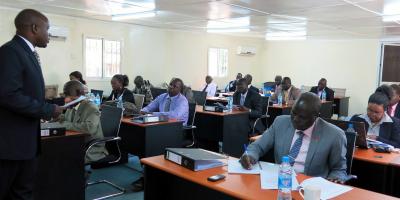
by Stephen Mubiru, IDLO Lead Trainer, Juba
I first travelled from Uganda to Juba in 2009, as part of the IDLO team conducting justice sector training there. South Sudan itself did not yet exist as an independent country, there was an interim constitution and peace negotiations were ongoing.
Our first one-month course focussed on criminal and civil proceedings – how to conduct a trial –bringing together judges from across what would become the world’s newest nation.
Having been in touch with some of the local judges before the training, I had an idea of their ability and professional capacity, but other factors took me by surprise on my arrival.
First and foremost was the environment, particularly the infrastructure; the training facilities were often just temporary structures.
In contrast, though, the logistics and organization of the training far exceeded my expectations for a country that had been at war for many years.
Initially, I had also, perhaps, not fully appreciated the differences of their judicial system; it was something of a hybrid between the continental civil law and a common law system. This raised some challenges for us during the first round of training, but became less of an issue for subsequent courses.
Most of the lawyers in South Sudan were trained in Sudan, where a Shari’a and civil law system operates in Arabic. The legal system in South Sudan has shifted to a common law system, with English as the official language. This shift has created capacity gaps; many judges and lawyers have needed training.
But probably the greatest surprise for me arose from the heated debates with local judges on some of the course topics, in particular areas like human rights or rights of children.
The huge influence of traditional legal systems and of cultural values on South Sudan’s justice system became increasingly apparent to us. Local judges explained that if the law didn’t take into account the cultural context, then it would most likely be misunderstood and mistrusted by the communities they worked with, who tended to resort to traditional mechanisms to resolve their disputes. They weren’t convinced that international law or human rights had a place in South Sudan.
But through these discussions, we also came to realise that, at this time, the statute books were not provided to all judges in South Sudan, and were only available in Juba. We brought these to the attention of the judges from other parts of the country, showing them that their laws did, in fact, reflect these concepts.
Since 2009, I have returned to South Sudan to lead several courses; the most recent being the 2014 course for judicial assistants on Criminal Procedure and the current training of public prosecution lawyers in the Administration of Criminal Justice and English Language.
Whatever the course, whoever the participants, towards the end of their training, they often tell me how much they have appreciated its practical nature; but what is most valued, time and again, is the sense that the material has been shaped to reflect their roles, their legal system and the laws of South Sudan.
In a new state with a long history of conflict and with ongoing sporadic fighting in some parts of the country, the process of establishing the rule of law firmly is bound to take time. This type of training is a small contribution to that process. Hopefully it will have a bigger, long-term impact as peace and security are fully restored in South Sudan.

